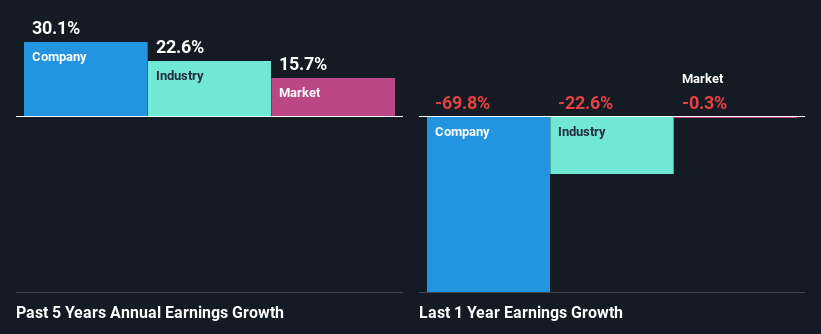Sims Limited's (ASX:SGM) Fundamentals Look Pretty Strong: Could The Market Be Wrong About The Stock?
With its stock down 18% over the past three months, it is easy to disregard Sims (ASX:SGM). However, stock prices are usually driven by a company’s financials over the long term, which in this case look pretty respectable. Specifically, we decided to study Sims' ROE in this article.
Return on equity or ROE is a key measure used to assess how efficiently a company's management is utilizing the company's capital. In short, ROE shows the profit each dollar generates with respect to its shareholder investments.
See our latest analysis for Sims
How Is ROE Calculated?
The formula for ROE is:
Return on Equity = Net Profit (from continuing operations) ÷ Shareholders' Equity
So, based on the above formula, the ROE for Sims is:
6.8% = AU$181m ÷ AU$2.7b (Based on the trailing twelve months to June 2023).
The 'return' is the yearly profit. One way to conceptualize this is that for each A$1 of shareholders' capital it has, the company made A$0.07 in profit.
What Is The Relationship Between ROE And Earnings Growth?
Thus far, we have learned that ROE measures how efficiently a company is generating its profits. Based on how much of its profits the company chooses to reinvest or "retain", we are then able to evaluate a company's future ability to generate profits. Assuming everything else remains unchanged, the higher the ROE and profit retention, the higher the growth rate of a company compared to companies that don't necessarily bear these characteristics.
A Side By Side comparison of Sims' Earnings Growth And 6.8% ROE
On the face of it, Sims' ROE is not much to talk about. Next, when compared to the average industry ROE of 10%, the company's ROE leaves us feeling even less enthusiastic. Despite this, surprisingly, Sims saw an exceptional 30% net income growth over the past five years. Therefore, there could be other reasons behind this growth. For example, it is possible that the company's management has made some good strategic decisions, or that the company has a low payout ratio.
As a next step, we compared Sims' net income growth with the industry, and pleasingly, we found that the growth seen by the company is higher than the average industry growth of 23%.
Earnings growth is a huge factor in stock valuation. The investor should try to establish if the expected growth or decline in earnings, whichever the case may be, is priced in. This then helps them determine if the stock is placed for a bright or bleak future. What is SGM worth today? The intrinsic value infographic in our free research report helps visualize whether SGM is currently mispriced by the market.
Is Sims Making Efficient Use Of Its Profits?
The three-year median payout ratio for Sims is 31%, which is moderately low. The company is retaining the remaining 69%. This suggests that its dividend is well covered, and given the high growth we discussed above, it looks like Sims is reinvesting its earnings efficiently.
Additionally, Sims has paid dividends over a period of nine years which means that the company is pretty serious about sharing its profits with shareholders. Upon studying the latest analysts' consensus data, we found that the company's future payout ratio is expected to rise to 41% over the next three years. Regardless, the future ROE for Sims is speculated to rise to 8.6% despite the anticipated increase in the payout ratio. There could probably be other factors that could be driving the future growth in the ROE.
Summary
Overall, we feel that Sims certainly does have some positive factors to consider. With a high rate of reinvestment, albeit at a low ROE, the company has managed to see a considerable growth in its earnings. That being so, a study of the latest analyst forecasts show that the company is expected to see a slowdown in its future earnings growth. Are these analysts expectations based on the broad expectations for the industry, or on the company's fundamentals? Click here to be taken to our analyst's forecasts page for the company.
Have feedback on this article? Concerned about the content? Get in touch with us directly. Alternatively, email editorial-team (at) simplywallst.com.
This article by Simply Wall St is general in nature. We provide commentary based on historical data and analyst forecasts only using an unbiased methodology and our articles are not intended to be financial advice. It does not constitute a recommendation to buy or sell any stock, and does not take account of your objectives, or your financial situation. We aim to bring you long-term focused analysis driven by fundamental data. Note that our analysis may not factor in the latest price-sensitive company announcements or qualitative material. Simply Wall St has no position in any stocks mentioned.

